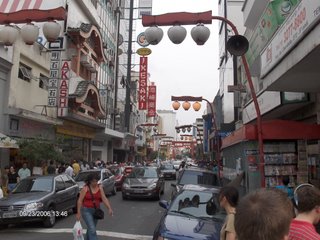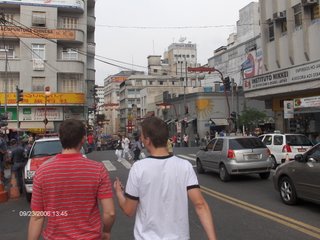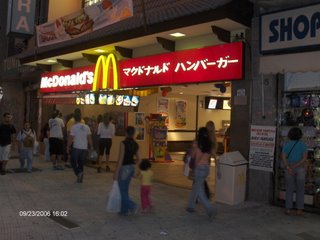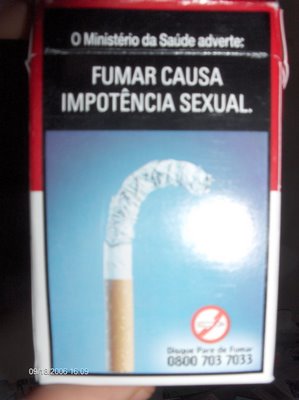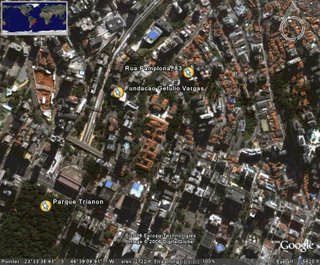
It seems the day after writing the last post - actually no - minutes after, I felt a lot better. Actually, I felt rather dramatic and exagerated after the fact for making my problems seem so overwhelming, but expressing them in English helped me relax a bit and see that they were transient in nature, and time has proven as much. I was surprised and pleased to receive consolatory e-mails from a bunch of people. Thanks.
Still Sans PC
After getting used to working again this summer, I've gotten back into the rhythm of academic life, though I'm still without computer. At this point, I'm almost used to the inconvenience. After spending ten business days calling the Lenovo Service Center in Brazil, and faxing copies of my passport, the computer invoice, etc., then making more calls, waiting and more calling, they finally cleared me for service; that is, they confirmed it was really me calling, and that my computer was covered under the "Accidental Damage Waranty" I purchased, so they transfered me to the Technical Support area to speak with someone who would address the needs of my situation. After uttering one sentence in which I relayed the fact that a beverage (it was a tall boy of Bud Light, but I didn't say that) was spilled on my keyboard, they put me on hold, came back after a long five minutes and said that that type of damage was not covered in Brazil, ponto. I hung up. I decided then and there that I would pay the $300 or whatever it cost at the other place, because wasting all this time is stupid. So, back at Casa do Notebook (pronounced No-Chee Buu-Kee) they told me they could do it, but it would be 15-30 days to receive the keyboard because it had to be ordered from the US. Also, because I took the computer out of the store after they performed the initial diagnostic test, they'd have to do another diagnostic that would be 3-5 more business days and another fee. All with a straight face, too! I left.
I went back to school and signed onto Messenger in the computer lab. I had chatted before with a girl from the store where I bought the computer in Virgina, and she was online that day. So I told her my situation, and she said that she could get a keyboard for me, it would be there the next day and would be FREE, and then she could overnight it to Brazil. Apparently, a keyboard is very easy to install, so someone in Virginia is going to walk me through the process over MSN Messenger. It's on its way. I'll have to see what kind of taxes I'll have to pay, but regardless, situations like this one make me appreciate the efficiencies of the first world.
Before I forget, the point of explaining all of these trifling details to you is to say that I would like to post more often and include digital photographs. But until I get my laptop fixed I will not be able.
School Life
School is going fine. I moved into a flat two block from campus and am very happy with my location and the amenities of my building (more about my place and the search for it in a future post). I have classes three days a week, and this module (each semester is made up of two eight-week modules) I am taking: Politics and Culture in Brazil; Brazilian Economy; Internet Business; Government and Civil Society in the Local Setting: New Approaches to Public Management and Equity.
There is a significant amount of work to do outside of class, but four-day weekends are a welcome change and something I highly recommend. My school, Fundação Getulio Vargas, Escola de Administração de Empresas (FGV-EAESP) or "GV" (pronounced Jay Vay) for short, is considered the best business school in Brazil. GV is actually an umbrella foundation that includes many schools, but the business school, EAESP, and others all share that prestigious reputation. It was fairly easy for me to get in as as study abroad student, so it's funny to me when I tell people what I'm doing here and most of them look at you with wide eyes and tell you that's the best in Brazil. Comparing the quality to the education to Georgetown, which is good but not the top ten for most disciplines, speaks very highly to the state of higher education at my school and in the United States in general. My classes at Georgetown are much harder and demand much more attention in and out of class; but I think that part of the experience of studying here for a semester takes place outside the classroom, and the class schedules reflect that.
The school resides in a nine-storey building in which there are several restaurants, a beer hall, classrooms, computer labs, a library, bookstore and administrative offices. I stick mostly to three floors, and often make use the snack-bar type counter by the computer labs for a morning coffee or whatever. You can smoke anywhere in the building except the classrooms, which is certainly different from what I'm used to. I'd have to say its annoying, even though I've been known to smoke. Overall, the environment at GV is relaxed and nice, and the people are friendly. It is fairly light and airy inside, because windows are usually open and stairs connect the floors. There are elevators, too, but they take longer, so I avoid them.
There is a mix of undergraduate, graduate a doctoral students, all doing their own thing in this building. The undergrads are greatest in number, and most of them are usually hanging out, smoking, kissing or making noise, and they are usually in the way of the stairs. They, like many Brazilians, seem to like to stop and chat in the middle of the staircase. Teachers rarely if ever are on time for class, and the students come in late as well. By habit alone, I am almost always the first person in the room. During lectures, the Brazilians that are in my classes seem to talk incessantly to each other, and rarely if ever are admonished or even asked nicely to stop by the teachers.
My classes are made up mostly of other international students, many of whom hail from Germany and France though the Czeck Rep, Hugary, Bulgaria, Romania, Spain, Colombia, Africa, the US and others are represented to some degree. Although I am in classes with many MBA and other master's degree students, because of the way European university systems are organized, many of the students are a few years younger, have never worked and live with their parents back home. In spite of this, they have been a good network and some friends have come from there too. Most of us live right near the school, and there are also a lot of things we have in common, namely that we're all learning about Brazil from a different perspective, so it works. Nonetheless, I'm working hard on cultivating Brazilian friendships.
My First Holiday Spent Here
This weekend is Independence Day for Brazil, which celebrates its freedom from Portugal in 1822. During Napoleon's reign in Europe starting around 1812, Portugal was invaded. The Portuguese crown, in order to evade harm, established itself for a short period in Rio de Janeiro. The monarch at that time, Dom João, wanted to remain in Brazil after Napoleon's forces had left Portugal, but was forced to return; however, his son, Dom Pedro, remained. He was then known as the prince regent and had the title Defensor e Protetor Perpétuo do Brasil. When he was ordered to return to Portugal in 1822, he defied the order and declared his will to make Brazil free. It stuck. Most Brazilians are off to spend a long weekend in Rio or somewhere. I was lazy and didn't put any effort into planning a trip, so I'm staying in town this weekend and will continue getting to know São Paulo. I hope to travel somewhere next weekend; I'm itching to get out and see some good stuff.


